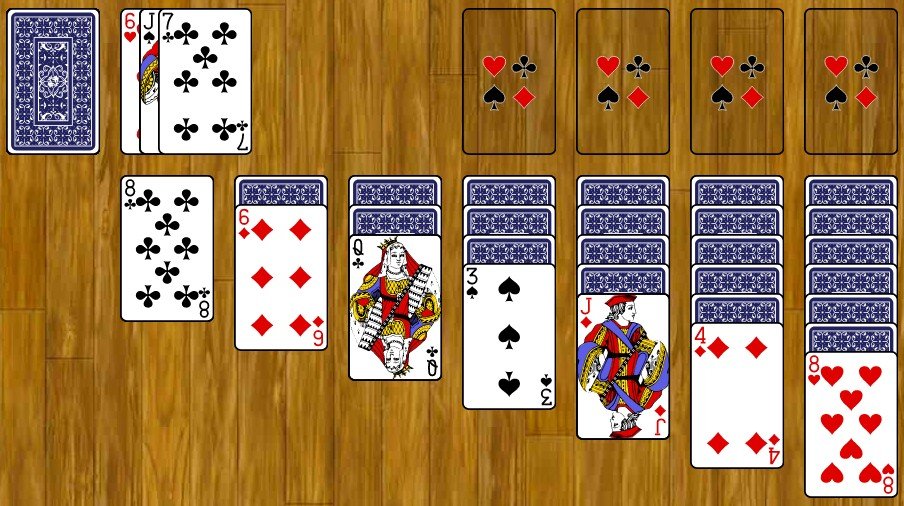In an era where digital games are often complex and high-tech, it’s refreshing to reflect on the enduring appeal of a classic game that requires little more than a deck of cards and a willingness to engage. Solitaire, a game that has captured the imaginations of players for generations, stands as a testament to the simplicity and elegance of card games. Whether played on a desktop or a smartphone, solitaire remains a beloved pastime around the world.
Origins and Evolution
The origins of solitaire, also known as patience games in some parts of the world, are somewhat murky, but it is widely believed to have originated in 18th-century France. Early forms of the game were known as “patience” games because they required players to use strategy and patience to win. The term “solitaire” itself is derived from the Latin word “solus,” meaning “alone,” reflecting the solitary nature of the game.
The game’s rise to global popularity began in earnest with the advent of personal computers. In the 1990s, Microsoft included a version of Solitaire with its Windows operating system, turning it into a ubiquitous pastime. The game’s inclusion in Windows was not merely for entertainment but served as a way to help users familiarize themselves with the mouse and interface, turning it into a staple of computer culture.
The Mechanics of Solitaire
At its core, solitaire is a game of strategy, patience, and skill. The most common version, Klondike Solitaire, is played with a standard 52-card deck and involves arranging cards in a specific order to achieve a successful layout.
Setup and Objective:
- Setup: The game begins with seven tableau columns of cards, where the first column has one card, the second has two, and so on, up to seven cards in the final column. The remaining cards form the draw pile.
- Objective: The goal is to build four foundation piles, one for each suit, in ascending order from Ace to King.
Gameplay:
- Players move cards between tableau columns, from the draw pile, and to the foundation piles, following specific rules.
- Cards can be moved from one column to another if they are of a different color and in descending order.
- The game requires strategic thinking to uncover hidden cards and build the foundation piles efficiently.
Variations and Challenges
While Klondike is the most recognized version, numerous variations of solitaire exist, each with its own unique rules and challenges. Some of these include:
- Spider Solitaire: Played with two decks, Spider Solitaire is more complex, requiring players to build sequences of cards in descending order and within the same suit.
- FreeCell: This version relies heavily on strategy, as players can move cards between cells to manipulate the tableau and build the foundations.
- Pyramid Solitaire: Here, cards are arranged in a pyramid shape, and the goal is to remove pairs of cards that add up to a specific total.
Each variation introduces new layers of complexity, ensuring that players can always find a version of solitaire that suits their taste.
The Psychological Appeal
Solitaire’s enduring appeal can be attributed to several psychological factors. The game’s inherent simplicity allows players to focus on strategy and problem-solving without being overwhelmed by complex rules. Additionally, the sense of achievement from winning a game provides a satisfying reward for the player’s effort and skill.
Moreover, solitaire serves as a meditative escape, offering a quiet break from the stresses of daily life. It provides a solitary moment of calm where the player can immerse themselves in a focused and mindful activity.
Modern Adaptations
In the digital age, solitaire has evolved from its humble origins. Online platforms and mobile apps have introduced new features, such as timed challenges, competitive modes, and varied themes, to keep the game fresh and engaging. Despite these modern twists, the essence of solitaire remains unchanged, preserving its core appeal of strategic thinking and solitary enjoyment.
Conclusion
Solitaire’s charm lies in its simplicity and the mental challenge it offers. It is a game that has adapted to technological advancements while retaining its classic roots. Whether you’re a seasoned player or a newcomer to the world of card games, solitaire continues to be a source of entertainment and relaxation. As we advance further into the digital age, the timeless allure of solitaire reminds us that sometimes, the simplest pleasures are the most enduring.
